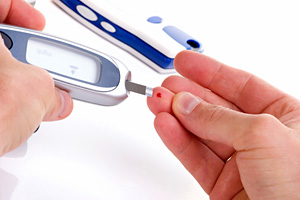Dodge Diabetes Now
By Julie T. Chen, MD
No one wants diabetes, but for those with a strong family history of this disease, the desire to avoid this debilitating disease is much stronger. What is hopefully a beacon of light at the end of this scary tunnel is that diabetes can be avoided or at least the severity can be significantly diminished by some lifestyle modifications that we can all incorporate into our life.
The most important thing is to monitor your diet. You need to eat foods that are low in glycemic load, which takes into consideration the glycemic index of a food and the quantity of it that you eat so that it measures the sugar load you consume at any given food intake point. When you learn to eat a low glycemic load diet, your body will be healthier because there won't be a rapid rise in blood sugar such that your body is unable to process it.
If you are concerned about diabetes, you should learn more about these key words such as glycemic load and glycemic index. You can also ask your physician for a fasting blood glucose level and a hemoglobin A1C level to see how efficient your body is at processing sugar at this point. If it is already impaired, it is extremely important to start implementing dietary changes as soon as possible.
Diabetes is a disease where if you catch it early and you take the steps to improve your health, it will definitely make an impact on the outcome. So, make sure you start learning about eating low glycemic index foods and keep in mind to keep all foods in moderation and smaller portions.
 While making dietary changes is a very potent way of impacting your diabetes risk factor, exercise is also extremely important in your battle against diabetes. Start by increasing your daily activity level and incorporating even small amount of exercise daily and build up to at least about 30 minutes of exercise on a daily basis with variations of activity types throughout the days of the week. If you are a beginner, you should enlist a personal trainer or ask a friend for help! This is so that you start exercising safely. You should also gain the approval of your doctor before you start this regimen to make sure you are safe to start.
While making dietary changes is a very potent way of impacting your diabetes risk factor, exercise is also extremely important in your battle against diabetes. Start by increasing your daily activity level and incorporating even small amount of exercise daily and build up to at least about 30 minutes of exercise on a daily basis with variations of activity types throughout the days of the week. If you are a beginner, you should enlist a personal trainer or ask a friend for help! This is so that you start exercising safely. You should also gain the approval of your doctor before you start this regimen to make sure you are safe to start.
Finally, there are a few things you can take to help with your sugar metabolism and I would start with the safest options. When you start to incorporate bitter vegetables into your diet and vinegars into your dressings and cooking, you'll naturally help your body's insulin sensitivity. Insulin is the main hormone that helps to take sugar from your blood stream and allows it to be processed into your metabolic demands of your body. The supplements you can take to help with this as well are cinnamon, alpha lipoic acid, nopal cactus, resveratrol, and bitter melon, just to name a few.
So, let's take those important steps away from diabetes by:
- Make sure to eat more bitter vegetables and vinegar dressings in our salads.
- Make sure to eat low glycemic index/load foods.
- Make sure to incorporate at least 30 minutes of activity or exercise into your daily routine.
- Supplements such as cinnamon, cactus, bitter melon, resveratrol, and alpha lipoic acid can help with insulin and sugar issues.
- Make an appointment with your doctor at least once yearly to check your fasting sugar levels.
Dr. Julie T. Chen is board-certified in internal medicine and fellowship-trained and board-certified in integrative medicine. She has her own medical practice in San Jose, Calif. She is the medical director of corporation wellness at several Silicon Valley-based corporations, is on several medical expert panels of Web sites and nonprofit organizations, is a recurring monthly columnist for several national magazines, and has been featured in radio, newspaper, and magazine interviews. She incorporates various healing modalities into her practice including, but is not limited to, medical acupuncture, Chinese scalp acupuncture, clinical hypnotherapy, strain-counterstrain osteopathic manipulations, and biofeedback. To learn more, visit www.makinghealthyez.com.

